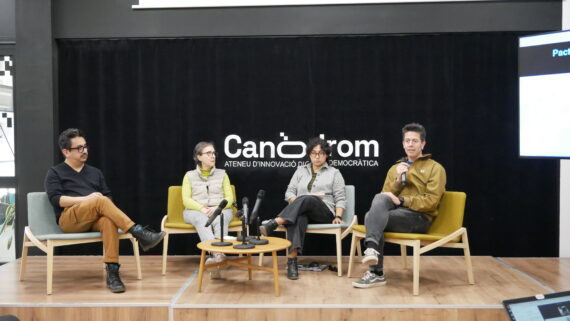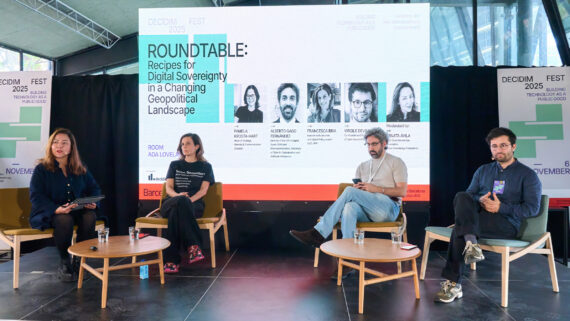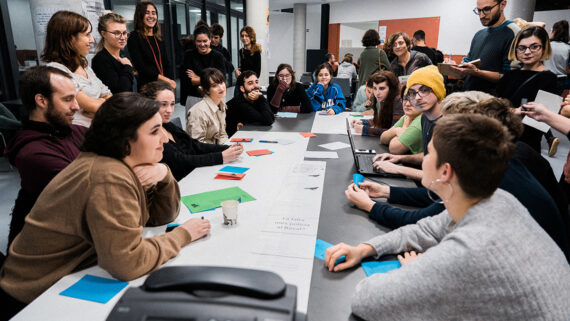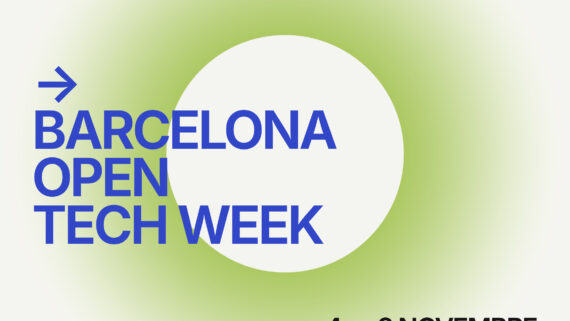The third session of the cycle 'Growing up between Screens? Education, Technologies, and Democracy' reflected on the challenges and opportunities of digital transformation in schools from a democratic and rights perspective, as well as integrating digital models inclusively into education.
How is the digitization model incorporated into schools?
Xavier Rossell reflected on how digitization is being addressed in schools, noting that each institution has its own uniqueness and faces unique challenges. “Now that we have connectivity and machines, and we’re receiving training to educate teachers, we should ensure that schools can better communicate their actions and that teaching experiences are transferred to classrooms through meaningful learning situations for students.”
He emphasized the importance of available resources, urging the exploration of new strategies and openness to ideas from the educational community. However, he noted, “to work in a network, a change in the model is needed.” He highlighted the necessity for proper support and the sharing of educational initiatives among teachers.
For Simona Levi, the main problem lies in laws that prevent sharing in classrooms, based on the promotion of a proprietary digitization model. “There is a perversion in this idea of sharing; that’s why at Xnet, we explain how the main problem is that many multinational corporations have taken over the digitization of schools.”
Faced with the challenge of changing how we teach and learn, it is essential for teachers to engage and explore new teaching methods. According to Sussana Tesconi, “despite the initial difficulties, focusing on technology creation offers us a more enriching and flexible approach to learning.”
The importance of creativity in the classroom “goes beyond generating ideas; it is about giving students the ability to create and transform their visions into reality,” Tesconi affirmed. “Through innovative practices like the maker movement, students can collaborate, experiment, and create meaningful artifacts,” she added.
Best Practices
In Catalunya, the majority of schools utilize Google tools, notwithstanding Denmark’s ruling that it breaches minors’ privacy. Since 2019, Xnet has been diligently working on a transformative proposal for schools called Suite DD, an alternative of sovereign and democratic digital educational infrastructure.
In 2021, they embarked on exploring the integration of sovereign technological tools in classrooms, which has since been tested in 11 schools in Barcelona. Suite DD incorporates open-source tools, functioning similarly to proprietary ones like Google, but with a sense of freedom and style. Levi emphasizes, “tools like Google Classroom lack interoperability, which can make you feel compelled to use them.” In April of this year, the Barcelona City Council, the Government of Catalunya, and Xnet entered into an agreement to develop and promote technological prototypes based on Suite DD, with intentions to implement it in 50 schools across Catalunya.
Some Outstanding Challenges
Simona Levi highlighted the importance of sovereign digitization in educational institutions, advocating for a shift away from dependence on large corporations. Emphasizing the necessity of sharing resources and knowledge, Levi endorsed a transformation that upholds the digital rights of the educational community. “The digitization of schools should not be dictated by large corporations; instead, we should prioritize local control and respect for the digital rights of our students and teachers,” she asserted.
Susanna Tesconi underscored the role of creativity in the digital transformation of classrooms. From the perspective of experiential learning, Tesconi emphasized the significance of creative practices and flexibility in curriculum design. “Digitization should not solely focus on technology usage but also on the ability to create and modify using it,” she emphasized.
Xavier Rossell, a technology teacher in secondary education, stressed the importance of sharing experiences and resources among educational institutions. “It is crucial for teachers to collaborate and exchange experiences to establish an effective digital learning environment,” he affirmed.







